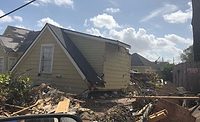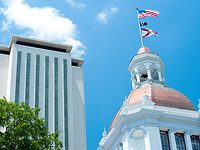Environmental Impact
How Different State Insurance Laws Impact Roofing

Image courtesy of Wikipedia
As Florida legislators continue to wrestle with its out-of-control insurance market — which some lawmakers claim results from roofing contractors and frivolous lawsuits — other states may begin to take notice and sign their own "me-too" policies into law.
Most recently, the Florida Office of Insurance Regulators approved a roof endorsement from Slide Insurance that could effectively nullify most roof claims with the exception of damage caused by hurricanes and named storms. One has to wonder whether other insurers will follow suit.
Until such time, however, it's important to know how some of the largest roofing markets are affected by the laws put in place. Below is a sample of some of the policies that attempt to rein in insurance price hikes while weeding out bad players.
 Florida: The Legislative Vanguard
Florida: The Legislative Vanguard
The flanking actions from both Tallahassee and Florida’s insurance carriers to staunch roofing insurance claims started two years before the current proposals. In June 2021, the legislature passed SB 76, which supporters successfully argued would curb excessive litigation and fraud involving roof damage claims, which have surged in recent years, driving up rates across the board.
The law shortened the period for filing a claim of loss from three years to two years after the date of loss. It also requires homeowners to provide a detailed estimate of the damages and repair costs at least 10 days before beginning legal action against an insurance company.
It also caps a plaintiff’s attorney fees based on a formula that compares the difference between an initial settlement offer and the final judgment amount.
The latest measures being weighed by the Florida Legislature throttle those measures far forward. The law passed in 2021 was not an outlier, though. State legislation designed to create speedbumps in the claims process began in 2017, with Texas establishing the beachhead.
 Texas: Property Owners, ‘Sorry, Charlie’
Texas: Property Owners, ‘Sorry, Charlie’
Texas, which perennially gets beaten up by hailstorms, also had a spate of bad luck in the hurricane department following the lashing by Hurricane Harvey, which made landfall as a Category 4 storm in August 2017, having sustained winds of 130 mph and gusts exceeding 145 mph.
Extensive damage from Houston to San Antonio was a gut punch as thousands of residential, commercial and industrial structures lost their roofs, with the damage estimate reaching $125 billion, according to the National Hurricane Center.
Following Harvey, the Texas legislature constructed Chapter 542A, adding it to the state’s insurance code in early September of that year. The regulation applied specifically to weather-related property damage claims and now requires customers to give insurance companies 61 days written notice before filing a lawsuit. The rules now allow insurance companies to assume liability for their agents and adjusters, ostensibly reducing the number of named defendants in a civil action.
Advocates said the code revisions would discourage frivolous lawsuits and abusive practices by some lawyers and public adjusters, who, they claimed, were taking advantage of existing statutes encouraging property owners to litigate instead of settle with insurance companies.
The code update also addressed penalties for untimely claims remittances and even went after attorney fees. It lowered the penalty interest rate for delayed payment of claims from 18% to 10% — and required customers to prove insurance companies acted “knowingly or recklessly” to recover attorney fees. Proving malice through the discovery process is both timely and extremely expensive, especially for any individual plaintiff to fund.
Opponents argued that the amended code only weakened the rights and remedies of customers with legitimate claims against insurance companies acting in bad faith by delaying or denying payment. In essence, the power shifted from customers to carriers, giving the insurers little incentive to settle claims timely or fairly.
 California: Insurance Companies, 'Where You Going?'
California: Insurance Companies, 'Where You Going?'
What the Gulf of Mexico takes from Texas, fire consumes in the Golden State. In 2018, California experienced its worst wildfire season on record to date. It was a ruthless year, with nearly 2 million acres of land scorched. Worse, that was the year of the twin terrors, the Woolsey Fire and the Camp Fire, which killed at least 85 people and destroyed more than 18,000 structures, according to CAL FIRE, the state agency in charge of wildfire management.
According to the California Department of Insurance, insurers paid out more than $26 billion in claims for the 2017 and 2018 wildfire seasons. As a result, many insurers stopped renewing policies or increased premiums exponentially for homeowners in fire-prone areas, leaving them with limited or unaffordable options.
To staunch the bleed, the California legislature passed a law in 2019 empowering the state’s Insurance Commissioner to impose a one-year moratorium on non-renewals for policyholders who live in or adjacent to a declared wildfire disaster area.
The law also required insurers to provide at least 75 days’ notice before informing a customer their policy would not be renewed due to wildfire risk; carriers also had to offer a comprehensive mitigation plan to help homeowners reduce their risk to keep their coverage. The eligibility criteria for access to California’s “FAIR Plan,” the state's “insurer of last resort,” was also expanded.
State officials have since extended the non-renewal moratorium twice, covering more than 2.4 million policyholders in 2020 and at least 26,000 in 2021, according to the California Department of Insurance.
 Colorado: Fair Treatment, Scofflaws Need Not Apply
Colorado: Fair Treatment, Scofflaws Need Not Apply
Altitude hasn’t protected Colorado from Mother Nature’s wrath, particularly from hailstorms. Often costly to repair, especially for roofs, hail damage is one of the most common and expensive claims nationwide, and Colorado racks up the costs.
According to the Rocky Mountain Insurance Information Association, Colorado had the second-highest number of hail claims in the nation from 2017 to 2019, with more than $3 billion in insured losses. Those costs helped prompt a raft of legislative action in 2018, with four bills enshrined into law both protecting consumers and ensuring the state’s insurance market remained functioning.
To help protect insurance companies and consumers from fraudulent or inflated claims, the Colorado legislature passed several laws in 2018 and 2019 regulating how claims are handled and roofing contractors operate, including:
- HB 18-1207 | requires public adjusters to be licensed by the state and to disclose their fees and services to policyholders.
- HB 18-1289 | prohibits roofing contractors from offering or providing incentives or rebates to policyholders for making an insurance claim or using their services.
- HB 19-1283 | requires insurers to provide a written estimate of repairing or replacing a roof when they make a settlement offer and explain how they calculated depreciation and other deductions.
- SB 19-180 | prohibits roofing contractors from acting as public adjusters or negotiating with insurers on behalf of policyholders unless they are licensed as public adjusters.
Another law Colorado enacted in 2018 was the Weather Modification Act, which extends the regulation of people who “modify” the weather until 2033: anyone who engages in weather modification activities, such as cloud seeding or hail suppression, must obtain a state permit and report their operations and results.
The public reaction to these laws has been mixed. Some people support them as necessary measures to protect consumers and insurance companies from fraud and abuse. They argue that these laws promote transparency and accountability in the insurance industry and prevent false or exaggerated claims about weather-related events. They also claim that these laws help preserve the natural balance of the climate and prevent unintended consequences from weather modification.
Looking for a reprint of this article?
From high-res PDFs to custom plaques, order your copy today!






